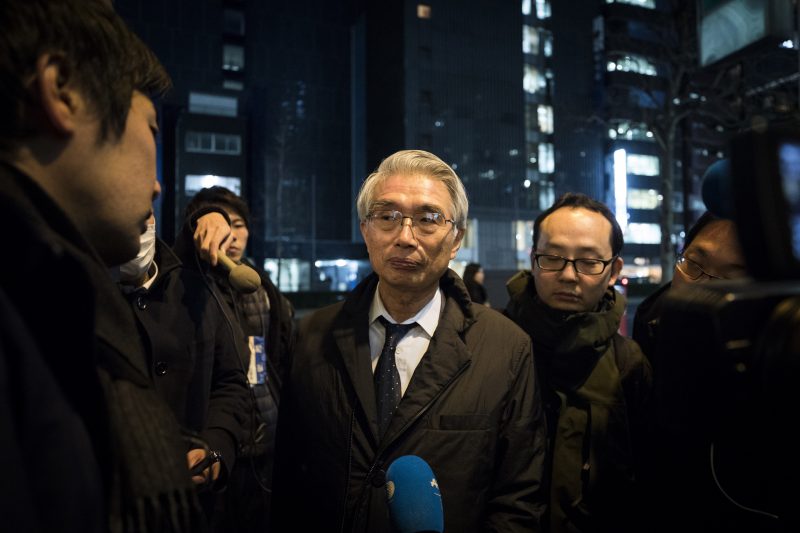With legal team shake-up, Ghosn seeks punchier defence
Junichiro Hironaka, Carlos Ghosn’s new lawyer is known as “the acquitter” in Japanese legal circles (Behrouz MEHRI)
Tokyo (AFP) – By changing his lead attorney from a former prosecutor known as “the breaker” to a hotshot trial lawyer nicknamed “the acquitter”, Carlos Ghosn plans a defence in his own image — combative and media-savvy, experts say.
In the chaotic aftermath of Ghosn’s stunning arrest last year on financial misconduct charges, the appointment of Motonari Otsuru — an ex-head of the elite prosecution team investigating the case — seemed a shrewd move by the auto tycoon.
Who better than a former prosecutor, who won his nickname by extracting confessions from suspects, to navigate the sometimes arcane Japanese legal system and predict what authorities would throw at them?
But the reality is that legal triumphs have been few and far between for the former Nissan chief, who has been in a Tokyo detention centre for three months with little prospect of release before a trial that could take months to materialise.
Otsuru can only point to one surprise victory — where the court refused to extend Ghosn’s detention — but he has twice failed to win bail for his client and eventually threw in the towel, resigning on Wednesday.
“From the beginning, Ghosn needed a lawyer capable of taking on the prosecutors and that is not Otsuru,” said Japanese attorney Nobuo Gohara.
“Even after becoming a (defence) lawyer, he never criticised the prosecutors,” Gohara told AFP.
Indeed, at his only public appearance, Otsuru surprised many Western observers with his demeanour — cutting a rather passive and academic figure far removed from the sort of adversarial defence lawyer seen in the US or Britain.
He declined to agree with foreign criticism of Ghosn’s detention conditions or the Japanese legal system that allows suspects to be held almost indefinitely, appearing to side with the authorities against his own client.
Otsuru also said Ghosn was unlikely to win bail, describing it as “very difficult” before a trial he said could take as many as six months to organise.
According to legal expert Gohara, Otsuru himself probably did not believe in his own bail requests — knowing from his experience as a prosecutor they stood little chance of success.
“However, it is possible that if the requests were filed with good arguments, they might have been accepted,” said Gohara.
– ‘Fighting talk’ –
Another lawyer, Yasuyuki Takai, told AFP that Otsuru and Ghosn — who have spent hours together over the past three months — were probably incompatible.
“I think that Ghosn, given his personality, did not do what his lawyer told him and that would be difficult to accept for Otsuru, who wants the client to listen to him,” said Takai.
Otsuru is also unlikely to have welcomed Ghosn offering media interviews — including to AFP — from his cell, or the release of several statements via PR firms.
In one of these statements Ghosn offered to wear a tracking bracelet as part of his bail conditions, apparently unaware they were not used in Japan.
With such tactics Otsuru “probably felt dishonoured” within the legal profession, said Takai, with his resignation a “logical” consequence, according to Gohara.
“It seems that the two personalities were not compatible and for Ghosn, there was little benefit of continuing with Otsuru.”
The new man in charge, Junichiro Hironaka, has an enviable record of securing acquittals for high-profile clients — beating the odds in a system where almost every trial ends in a conviction.
Hironaka may also be more inclined to follow his client’s instructions, according to Takai.
After the appointment, Ghosn issued a typically bullish statement saying the shake-up was “the beginning of the process of … establishing my innocence”.
That was “fighting talk”, said Gohara and “it should be followed up by fierce lawyers” using the media on the prosecutors at every opportunity.
Gohara said the team was now “well constructed”, with Hironaka “a lawyer who has really had to fight to the end in many cases” — including securing the acquittal of a high-profile politician in 2012 of election finance fraud charges.
Hironaka’s wingman will be Hiroshi Kawatsu, who has voiced criticism of the Japanese legal system where defence lawyers are not present at their clients’ interrogation and receive documents only late in the case.
Disclaimer: This story is published from a syndicated feed. Siliconeer does not assume any liability for the above story. Validity of the above story is for 7 Days from original date of publishing. Content copyright AFP.


